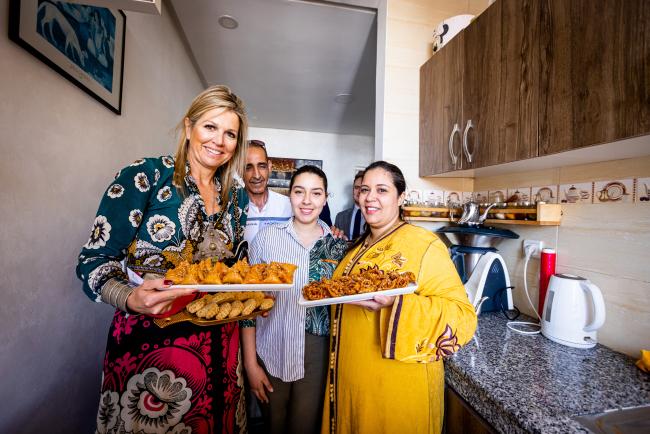
From nurse to entrepreneur, Loubna Laqioud's journey has been a sweet one. Five years ago, Laqioud decided to take a chance and start a home-based business baking traditional Moroccan cookies and pastries where she lives in Casablanca. Today, the 39-year-old’s treats are in demand, especially during periods like Ramadan.
Laqioud was aided in part by microfinance institution Arrawaj Foundation. Unable to obtain a loan for her business from a traditional bank due to insufficient credit history, Laqioud received her first loan from Arrawaj Foundation in 2013. She has received loans to purchase equipment and ingredients, as well as invest in marketing efforts, to grow her business. And microinsurance, a service offered by Arrawaj Foundation in conjunction with the microcredit loan, also enabled her to weather an unexpected setback when a devastating fire destroyed a substantial section of her apartment in 2019.
Arrawaj Foundation, created in 1996, aims to reach finance micro-entrepreneurs and businesses typically excluded from the formal financial system. The organization offers microcredit (max 50,000 MAD or nearly USD $5,000), microinsurance, and non-financial services like training, advice, and client support.
Its microinsurance products cover risks such as death, disability, hospitalization, and housing—critical to help people build financial resilience to economic and climate shocks. Arrawaj Foundation’s clients can receive their insurance compensation directly to a mobile payment account, meaning there is no need to travel to an agency, a first in Morocco and for the country’s microfinance sector.
With approximately 843,000 active microcredit clients in Morocco, microcredit organizations such as Arrawaj Foundation have played an important role in financial inclusion efforts in the country. Microfinance is a particularly important tool to promote women’s economic empowerment. Providing loans for women entrepreneurs to begin at-home businesses can facilitate greater economic independence. The financial inclusion gender gap is among the highest in the world at 23% (Global Findex, 2021).
A new, landmark microfinance law introduced in Morocco in July 2021 has created fresh opportunities for microcredit organizations to play a larger role in deepening financial inclusion. The law allows for non-profit organizations to transform into for-profit finance companies and the chance to offer savings and deposit products. There is substantial opportunity to grow the microfinance sector through embracing digital transformation, including by partnering with fintechs.
In recent years, Arrawaj Foundation has invested in enabling clients to conduct transactions via their smartphones. The potential of mobile money to increase revenue greatly interests Moroccan entrepreneurs such as Laqioud. Although she operates only in cash, Laqioud told the UNSGSA during a March visit to her home-based business that she would like to start using mobile money, assuming her customers start to use it more frequently, too. Currently, only 6% of people in Morocco report having a mobile money account, according to the 2021 Global Findex.
Laqioud said she would like to capitalize on the marketing skills of her daughter, Aya, whose digitally savvy on Instagram has led to an increase in demand. She aims to one day have a website to offer her baked goods and accept digital payments from customers. And, in the coming years, Laqioud hopes to save enough to expand her business and establish a proper store.
However, she told the UNSGSA that she faces financial obstacles to achieve this future. Laqioud still needs to work as a medical assistant in a dental clinic to help make ends meet, as the business does not generate enough income to cover all her expenses. She also cannot afford to purchase a smartphone and consistent subscription to an internet connection. Additionally, she does not have the time or financial means to attend the necessary training to sell her products online.
Given the evolving role for microcredit institutions, notably due to the new legal framework, there is hope moving forward the sector can play a larger role in providing innovative financial solutions promoting resilience for businesses like Laqioud’s throughout Morocco.